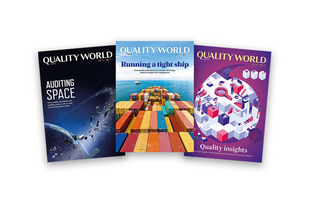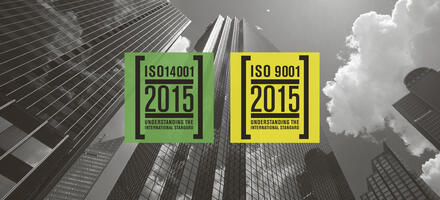
The dangers of cowboy certification
Progress indicator

In an extract from Quality World magazine (June 2017), Rob Fenn, CQP FCQI, chief executive of the British Assessment Bureau, reveals how cowboy certification is threatening the reputation of ISO 9001:2015 and the industry. He speaks to UKAS about the value of accreditation and the pitfalls for organisations tempted to cut corners.
The UK remains one of ISO 9001’s biggest fans, with more than 40,000 certificates issued each year for the past decade. Popularity is driven by the view that ISO 9001 is a pre-qualification tool for procurement teams in the public sector. Whether a council department requires a new road laying, recruiting assistance, or a website designer, ISO 9001’s applicability to all industries has helped it become an entrance requirement for separating the wheat from the chaff.
In turn, UK businesses keen to grab a slice of the £762bn public sector pie have sought ISO 9001 certification to be in with a chance of winning potentially lucrative contracts.
An unregulated industry
Achieving certification, on the face of it, appears fairly straightforward. An organisation simply needs to contact a certification body, of which there are many, to audit it against the requirements of the standard so it can receive their all-important certificate.
When being audited, the obvious question is: who checks the checker? That responsibility lies with the United Kingdom Accreditation Service (UKAS), which is the country’s sole National Accreditation Body. In turn, UKAS assesses certification bodies against a standard called ISO 17021, which contains requirements centred on competence, consistency and impartiality.
With the pressures on businesses to achieve ISO 9001 certification to qualify for work, decisions are often made hastily
Despite UKAS being appointed as the National Accreditation Body in the UK's Accreditation Regulations 2009, UKAS is not a regulator. Although it appears to be the only option, some certification bodies claim to hold accreditation with alternatives to UKAS.This grey area has caused a dispute within the industry and some are now questioning if all ISO 9001 certificates are equal.
Trevor Nash, chief executive at the Association of British Certification Bodies (ABCB), which represents UKAS-accredited certifiers, commented: “It is set out in European law under Article 7 of EC regulation 765/2008 that certification bodies claiming accreditation must use the government-appointed UKAS.
“Despite this, there are examples of UK-based certification bodies suggesting that they are otherwise accredited and meeting the ISO 17021 standard.”
The importance of impartiality
To protect impartiality, the ISO 17021 standard strictly bans certification bodies offering consultancy and certification. Clause 5.2.5, ISO/IEC 17021-1:2015, prohibits the certification body, any part of the same legal entity and any entity under the organisation control of the certification body from offering or providing management system consultancy.
In 2012, the Department for Business, Energy and Industrial Strategy (BEIS), which oversees UKAS, cited Regulation (EC) 765/2008 which explains ‘accreditation’, within the meaning of the regulation, can only be obtained in the UK from the United Kingdom Accreditation Service.
A statement by BEIS clarified that any organisation suggesting it is accredited (in the sense of the regulation) when it is not is likely to be guilty of an offence under the Business Protection from Misleading Marketing Regulations 2008 (Statutory Instrument 2008/1276). Those choosing to ignore this advice could get a two-year prison sentence or a hefty fine.
At first glance all certification bodies appear to deliver the same service; many simply aren’t aware of the role that UKAS accreditation plays
Malcolm Shiel is a quality management consultant and founder of Xtremia, a consultancy which helps business achieve ISO 9001 and ISO 14001 accreditation. He claims this punishment has done little to discourage some certification bodies from following an ‘alternative’ path.
“A simple Google search will reveal non-UKAS accredited certification bodies brazenly providing consultancy in combination with certification,” Shiel reveals. “In effect, they are offering to do almost all of the work involved in building a quality management system for the organisation.
“This brings a major question mark over the resulting effectiveness of the system and whether the organisation is truly living by the ideals of ISO 9001 – delivering a consistently high level of service.”
20,000 cowboy certificates
The lack of action taken against non-UKAS accredited bodies is leading some to question what damage this is doing to the reputation of ISO 9001 itself.
If organisations do not integrate ISO 9001 into the way they operate, the standard will neither benefit them or their clients. If the public sector wants to ensure they receive a quality service, and are spending taxpayers’ money wisely, they should follow through with the regulations and take action on those claiming alternative accreditation.
With the pressures on businesses to achieve ISO 9001 certification to qualify for work, decisions are often made hastily. At first glance all certification bodies appear to deliver the same service; many simply aren’t aware of the role that UKAS accreditation plays.
It is understandably appealing to see a certification option that appears to be significantly cheaper and easier to obtain. However, at the British Assessment Bureau we receive calls most days from organisations finding their certificates are rejected because there is no UKAS logo. However, some slip through the net having not been appropriately checked.
Despite the government recommending UKAS-accredited certification in the report Accreditation and conformity assessment: guidance for business and government departments, some of its own departments are failing to heed this advice. When the certificates are eventually knocked back, it leads to the sorry situation where businesses have to pay to begin the certification process from scratch.
There is thought to be more than 20,000 certificates in circulation that are issued by non-UKAS accredited certification bodies. When asked if the BEIS and UKAS is doing enough to tackle the problem, Jon Murthy, marketing manager at UKAS said: “UKAS-accredited certification bodies have demonstrated their competence and therefore provide confidence to the market. Although UKAS is appointed by BEIS as the National Accreditation Body, UKAS is not a policing authority so has no direct powers to take action against organisations claiming to be ‘accredited’. However, UKAS-accredited organisations wishing to use the national accreditation symbols must comply with the official BEIS guidelines.
We receive calls most days from organisations finding their certificates are rejected because there is no UKAS logo
“Each organisation holding UKAS-accredited status will have its own schedule/scope of accreditation, listing the precise activities and standards it is accredited for. These schedules are individually numbered and carry the appropriate UKAS symbol. UKAS publishes all its schedules of accreditation in a freely searchable online database. Using this search facility will help identify if the UKAS-marked certificate or report is authentic, both in terms of its origins and the activities it is purporting to cover.”
On the face of it, ISO 9001 certification is an ideal prerequisite to improve the quality of the supply chain. With its international credibility, it also saves procurement teams the time of independently vetting each and every would-be supplier. However, this theory only works if ISO 9001 is implemented properly.
With a global framework set up for accreditation and certification to ensure robustness, the obvious question is why certification bodies seek the alternative path when there is already an accepted and recommended road to accreditation, which ensures any ISO 9001 certificate they issue is recognised everywhere. For now, confusion within the marketplace makes seeking certification a minefield for aspirational businesses looking to benefit from committing to quality management.
Rob Fenn, CQP FCQI, is chief executive of the British Assessment Bureau
Transition Training
Make sure you are prepared for transition to ISO 9001:2015 and ISO 14001:2015 with our Transition Training.
Member only

This article is free to access for a limited time only. Only CQI and IRCA members receive access to all content.


